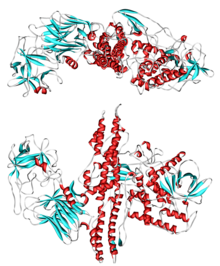Xeomin
 |
|
| Clinical data | |
|---|---|
| Routes of administration |
IM (approved), SC, intradermal, into glands |
| ATC code | |
| Legal status | |
| Legal status |
|
| Identifiers | |
| CAS Number | |
| DrugBank | |
| ChemSpider |
|
| Chemical and physical data | |
| Formula | C6760H10447N1743O2010S32 |
| Molar mass | 150 kg/mol (150,000 g/mol) |
|
|
|
| Bontoxilysin | |||||||||
|---|---|---|---|---|---|---|---|---|---|
| Identifiers | |||||||||
| EC number | 3.4.24.69 | ||||||||
| Databases | |||||||||
| IntEnz | IntEnz view | ||||||||
| BRENDA | BRENDA entry | ||||||||
| ExPASy | NiceZyme view | ||||||||
| KEGG | KEGG entry | ||||||||
| MetaCyc | metabolic pathway | ||||||||
| PRIAM | profile | ||||||||
| PDB structures | RCSB PDB PDBe PDBsum | ||||||||
| Gene Ontology | AmiGO / EGO | ||||||||
|
|||||||||
| Search | |
|---|---|
| PMC | articles |
| PubMed | articles |
| NCBI | proteins |
Botulinum toxin (BTX) is a neurotoxic protein produced by the bacterium Clostridium botulinum and related species. It prevents the release of the neurotransmitter acetylcholine from axon endings at the neuromuscular junction and thus causes flaccid paralysis. Infection with the bacterium causes the disease botulism. The toxin is also used commercially in medicine, cosmetics and research.
Botulinum is the most acutely lethal toxin known, with an estimated human median lethal dose (LD50) of 1.3–2.1 ng/kg intravenously or intramuscularly and 10–13 ng/kg when inhaled.
There are seven types of botulinum toxin, named type A–G. Type A and B are capable of causing disease in humans, and are also used commercially and medically. Types C–G are less common; types E and F can cause disease in humans, while the other types cause disease in other animals. Botulinum toxin types A and B are used in medicine to treat various muscle spasms and diseases characterized by overactive muscle. The commercial form is marketed under the brand name Botox, among others. Botox is made by Allergan.
Botulinum toxin is used to treat a number of problems.
Botulinum toxin is used to treat a number of disorders characterized by overactive muscle movement, including post-stroke spasticity, post-spinal cord injury spasticity, spasms of the head and neck,eyelid,vagina, limbs, jaw, and vocal cords. Similarly, botulinum toxin is used to relax clenching of muscles, including those of the oesophagus,jaw,lower urinary tract and bladder, or clenching of the anus which can exacerbate anal fissure. It may also be used for improper eye alignment. Botulinum toxin appears to be effective for refractory overactive bladder.
...
Wikipedia
